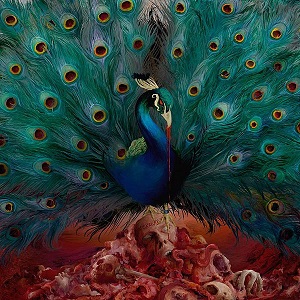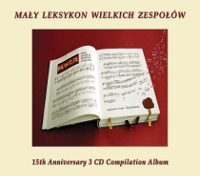Prog Number Three.
I’m going to keep this review pretty short. Not that the new Opeth record, hauntingly called ‘Sorceress’, offers little to talk about. On the contrary, it’s got some pretty intense songs on it and it’s got some lighter acoustic stuff. It is diverse as much as Opeth can be diverse, which is quite a lot, in fact. But it stays well within the groove set by its two predecessors, ‘Heritage’ and ‘Pale Communion’. Here I think I need to delve a bit into Opeth history books and explain for those who may not know that the Swedes made a volte-face following their 2008 ‘Watershed’ album. Up to that point their output could have been described as progressive death metal. Growls, heavy riffs and a mighty rhythm section were staples, but what set the band really apart from most of their peers on the metal scene was their creative composing ingenuity, a sense of melody and structure and frontman Michael Akerfeldt’s knack for employing the 70s' prog era sensitivities to his music’s advantage. The end result was always very diverse (for a metal band and any band, for that matter) records, with many songs well over 5 minutes, complex song structures and death growls alternating with clean vocals. Albums such as ‘Blackwater Park’ (their actual breakthrough, a classic now), ‘Deliverance’ and the purely prog record ‘Damnation’ all set pace for the band and garnered them widespread acclaim, excellent press and tons of respect from metalheads and prog aficionados alike.
But they weren’t going to stop at that. They went a notch further on their 2011 ‘Heritage’ record, where they completely did away with Akerfeldt’s trademark growls and heavy playing and turned into a cleaner, lighter version of themselves. A few line-up changes along the way might have helped as well. Since then the band have been going more in the progressive rock direction than anything else. So, I called this article ‘Album Number Three’ quite for a reason. ‘Sorceress’ is the third album in that new direction. Unlike its predecessor, ‘Pale Communion’, it features some markedly heavier material, though, such as the title track. It is preceded by a nice little lead-in, called ‘Persephone’, mostly acoustic with some soft spoken females vocals. Returning to the title track, one can actually call it a ‘metal song’ (finally, it’s back to metal again here!), but with certain reservations. The lyrics sound pretty doomed too. Generally, the record offers a natural, well-balanced flow of music, with slow melodic songs transtitioning to more upbeat tracks, the latter, however, are more resemblant of classic prog. In this respect I can’t but praise the delicate keyboard parts by Joakim Svalberg and the intricate arrangements, especially on the title song, which gives a good idea of the record on the whole. The next track, ‘The Wilde Flowers’ is again a some intense (bot not metal) rhythm section complete with interweaving keyboard support and Akerfeldt singing away about ‘searing skin on a funeral pyre’ and stuff like that. It has a bluesy transition moment followed by guitarist Fredrik Akesson’s majestic solo to resolve into the refrain to quietly wittle away to end in some powerful drumming. To cut a long story short, this song has nearly everything we wish to hear in an Opeth composition: It’s diverse, intense and light then intense again, it has pretty sullen lyrics, beautiful vocals and that unmistakeable Opeth style, which didn’t go away when they became more prog.
‘Sorceress 2’ is a quiet, poignant acoustic piece featuring some of the most tender vocals we have heard from Akerfeldt. It is a nice follow-up to ‘Sorceress’ and works well as a fill before the next track.
'The Seventh Sojourn' offers some pretty nice oriental rhythm and melody, again reminiscent of earlier Opeth stuff. They seem to be fond of resorting to the ‘oriental’ in their repertoire when a fill is needed between the more powerful tracks. But I don’t mean it as criticism, just an observation.
In ‘Strange Brew’ we encounter some powerfully initricate guitar solos courtesy of Mr. Frederik Akkesson. Otherwise, it is quite in line with the rest of the tracks.
‘A Fleeting Glance’ takes a relaxed and bluesy pace, prompting the listener to just sit back, close their eyes and enjoy a perfect blend of Opeth’s trademark elements.
It’s when the ‘Era’ track kicks in to end the album that things started to get cool and edgy and fast and furious again. ‘Era’ is also pretty ‘metal’, but not due to any growls, completely absent on this album too, but its overall fast rhythm section.
‘Persephone (Slight Return)’ is just a nice keyboard-driven mellow closure, just under one minute long. It provides a nice finishing touch to what is overall a rather diverse record.
Summing up, ‘Sorceress’ is the third prog release from the Swedes in a row, building on the formula of ‘Heritage’ (2011) and ‘Pale Communion’ (2014). Is this a good album? If you welcome the prog incarnation of Opeth and can put up with the fact that death growls and other gritty stuff seem like a thing of the past now, or you love everything these guys put out, it is the right kind of record for you. If not, then you might just want to tough it out, because who knows ‘what lies waiting down that line’? It’s never late to get back to the roots.








